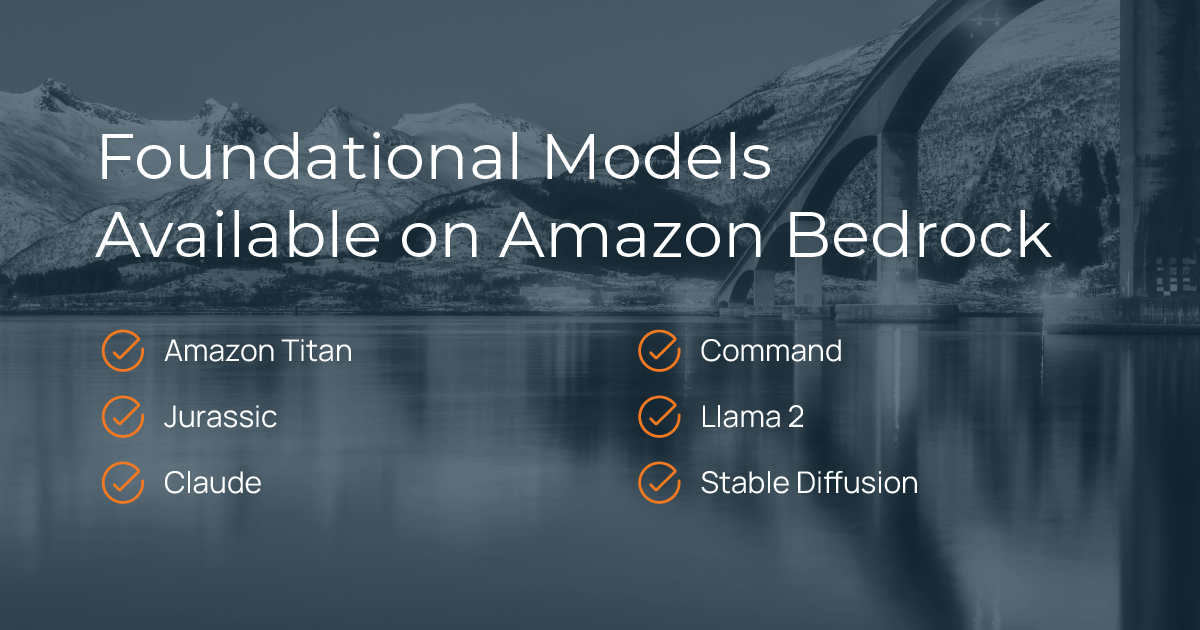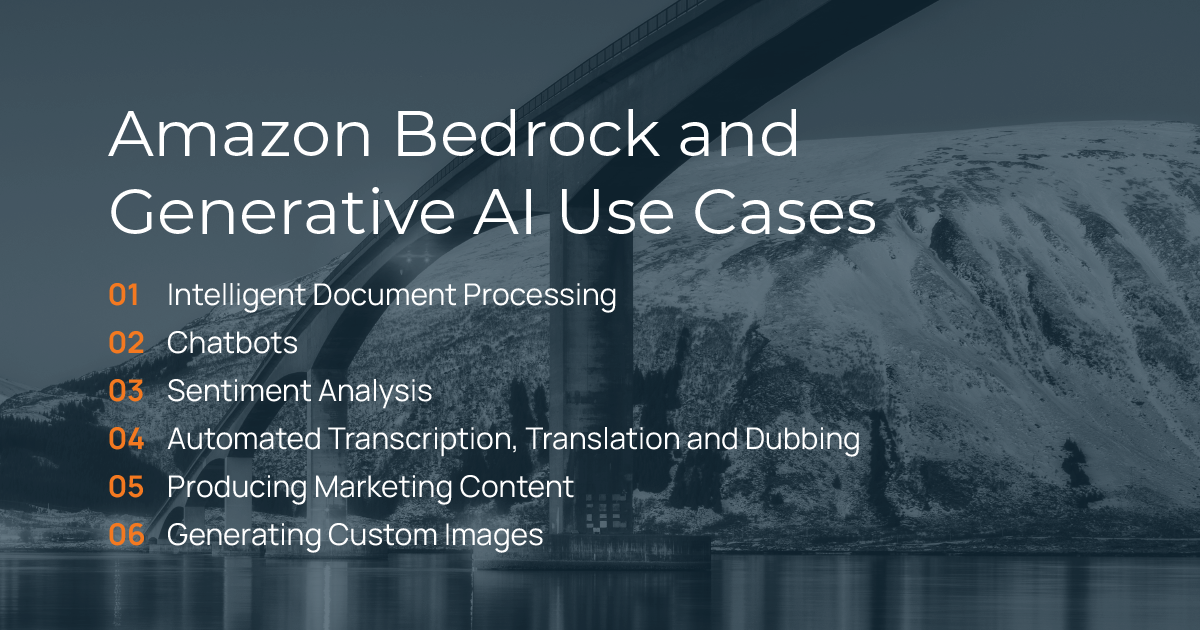No matter where you look today, all you hear in the technology space is about GenAI and how it can do everything. This has really come about due to advances in natural language processing that has made working with large language models easier than ever. You have multiple ways to interact with your LLMs, going through APIs, deploying them into your own cloud or on-premise clusters, or even building your own. Amazon Bedrock has made working with generative AI API endpoints more accessible. The fully managed service offers high-performing models from leading AI companies like AI21 Labs, Anthropic and Stability AI, and Amazon continues to expand its capabilities and offerings.
Bedrock offers the ability to quickly build and scale generative AI applications without putting privacy or security at risk, and it comes at a critical time. A recent survey found 53% of organizations acknowledge the cybersecurity risks associated with genAI, yet only 38% are actively working to mitigate that risk. With Bedrock, businesses can trust that their business, customers and data are safe.
Learn more about Bedrock, foundation models and their benefits in this blog post. Then, discover the different ways people interact with these models as well as common business use cases for generative AI with Amazon Web Services (AWS) and Bedrock and how you can leverage them in your business.
What Are Foundation Models and Who Uses Them?
At its core, a foundation model is an NLP model trained on vast amounts of data to understand and generate human-like text. These models can generate coherent and contextually relevant responses. They serve as the starting point for developers to build upon, saving time and effort in training models from scratch.

When it comes to accessing foundation models, there are four distinct groups of users, each with their own unique requirements and use cases. Let's take a closer look at these user groups and how they interact with foundation models:
Model Providers
Model providers play a crucial role in creating and offering foundation models. Companies like OpenAI, Cohere and AI21 Labs are at the forefront of developing these models. The differentiation among providers primarily lies in how they create their embeddings and curate their datasets. These factors contribute to the uniqueness and performance of their models. While there may be slight variations in performance, most large models perform similarly, making them suitable for a wide range of use cases.
Consumers
Consumers of foundation models have various ways to access and utilize them. One common method is through an API layer. However, traditional API access often involves sending data outside the ecosystem, raising concerns about data privacy and security. Amazon Bedrock addresses this issue by collaborating with seven major model providers to create an API layer that keeps data within the user's ecosystem. This ensures data security and provides API access to the most commonly used models.
For users whose preferred models aren't available in Bedrock, SageMaker JumpStart offers a solution. It provides pre-configured containers for models, simplifying the process of spinning them up and using them within the AWS environment.
Tuners
Tuners have a focus on fine-tuning foundation models for their specific use cases. These users invest time and effort in customizing models to achieve optimal performance and cost savings. They often use SageMaker JumpStart models or models from platforms like Hugging Face to fine-tune the models according to their specific requirements.
Users
Some users directly interact with foundation models without extensive customization. They rely on models like ChatGPT or Google's Bard to obtain answers or generate content. These users can also create serious risk by simply entering a prompt and copying an answer. Tools like Snyk can help analyze, validate and correct responses, but they’re not proactive solutions that eliminate risk completely.
Benefits of Amazon Bedrock
Amazon Bedrock offers many benefits that make it a powerful tool for building genAI applications. Let’s take a closer look at some key advantages Bedrock provides developers as they create tailored and efficient solutions.
Flexibility and Customization
Developers are free to choose from a variety of high-performing foundation models from leading AI companies. This allows them to experiment with different models and select the ones that best suit their specific use cases. Amazon Bedrock also provides an easy-to-use developer experience, enabling users to privately customize FMs with their own data through a visual interface. This customization process involves selecting training and validation datasets stored in Amazon S3 and adjusting hyperparameters to achieve optimal model performance. By fine-tuning the models according to their specific requirements, developers can ensure better accuracy and performance.
Fully Managed Agents
With Amazon Bedrock, developers can leverage fully managed agents to execute complex business tasks seamlessly. These agents can dynamically invoke APIs, eliminating the need for extensive code writing. Bedrock's managed agents streamline the development process by breaking down tasks, creating orchestration plans and executing them efficiently. This feature allows developers to focus on the core functionality of their applications, saving time and effort.
Native Support for RAG
Amazon Bedrock offers native support for retrieval augmented generation (RAG), enhancing the power of foundation models. By connecting FMs to company-specific data sources, developers can make the models more knowledgeable about their specific domains and organizations. This feature improves the accuracy and relevance of the generated outputs. Leveraging proprietary data, developers can further customize the outputs of the models, ensuring better alignment with their specific requirements.
Data Security and Compliance
The service provides several capabilities to support security and privacy requirements. User content isn't used to improve the base models and isn't shared with third-party model providers. Amazon Bedrock ensures that data is encrypted in transit and at rest, and users can encrypt the data using their own keys. Additionally, Bedrock offers features like HIPAA eligibility and GDPR compliance, ensuring that developers can build genAI applications in a secure and compliant environment.
Amazon Bedrock and Generative AI Use Cases
Amazon Bedrock is unlike any other genAI service. Like everything else on AWS, it was built for builders, providing additional power, tools and use cases to build generative AI applications and accomplish your business objectives at scale.
Intelligent Document Processing
GenAI can revolutionize document processing by automating data extraction, summarization and content generation tasks. Natural language processing models can analyze and understand the content of documents, making it easier to organize, search and extract valuable information. This technology can significantly improve efficiency and accuracy in industries like legal, finance and healthcare.
Max Goff, data science consultant at Mission Cloud, developed an architecture pattern that combines retrieval augmented generation (RAG) with a neoteric agent, dubbed Ragnarock, which can be used for IDP summarization as well as a litany of other NLP use cases that require integration of customer data, semantic intelligence and FM abilities.
Chatbots
GenAI enables the creation of intelligent chatbots that can engage in natural and meaningful conversations with users. AI-powered chatbots can understand user queries, provide relevant responses and even simulate human-like interactions by training models on vast amounts of conversational data. This technology is widely used in customer support, virtual assistants and other applications that require automated conversations.
Sentiment Analysis
Sentiment analysis is another powerful application of genAI. After learning from datasets of labeled sentiment data, genAI can accurately classify text as positive, negative or neutral, allowing businesses to gain valuable insights from customer feedback. This technology enables companies to track brand reputation in real-time, identify potential issues or areas for improvement and make data-driven decisions based on sentiment trends.
With GenAI's sentiment analysis capabilities, businesses can go beyond simply understanding the sentiment of individual comments or reviews. They can analyze large volumes of text data, such as social media posts, customer reviews or survey responses, to uncover overall sentiment patterns and trends. Companies can use this information to identify customer preferences, gauge public opinion about products or services, and even predict market trends.
Automated Transcription, Translation and Dubbing
AWS generative AI services can automate the process of transcribing, translating and dubbing audio and video content. Models trained on multilingual datasets can accurately transcribe spoken words, translate them into different languages and even generate synchronized dubbing. This technology is beneficial for media companies, content creators and language service providers to streamline their workflows and reach global audiences.
For example, MagellanTV, which offers a documentary streaming service, needed to internationalize its content, including foreign-language captioning and voice overdubbing. The company turned to Mission Cloud, which used AWS-native AI services to automate the existing manual process of creating and reviewing captions, and added the capability to automatically translate content for dubbing in any language desired.
Producing Marketing Content
GenAI can help generate marketing content, such as product descriptions, social media posts and ad copy. It can be used to generate creative and persuasive text that aligns with brand messaging and target audience preferences. This technology can save time and resources for marketing teams while maintaining consistency and quality in content creation.
For instance, real estate platform provider, myTheo, explored strategic growth opportunities and sought creative ways to increase revenue without requiring additional locations or facilities. With the help of genAI and Mission Cloud, myTheo now has a proof of concept for three new revenue-generating solutions, including the ability for real estate agents to leverage retrieval-augmented generation and an AWS LLM to create personalized newsletters based on specific characteristics or requirements.
Generating Custom Images
GenAI's capability to understand patterns and styles within data has unlocked a multitude of applications in the realm of image generation. By training a model on a dataset of images, it can learn the underlying characteristics and generate new images that closely resemble the AI training examples. This technology has found its place in various fields, including graphic design, virtual environments and personalized visual content generation.
In graphic design, for example, it serves as a valuable tool for designers seeking inspiration and exploring new ideas. By inputting specific design elements or styles, genAI can generate many images that embody those characteristics. This lets designers quickly iterate through different design options and create visually appealing graphics for branding purposes.

Building on Bedrock
We are at an inflection point. Some have compared recent advances in AI to potentially be as impactful as the invention of electricity as a service. In a few years, there will be organizations that have whole-heartedly adopted AI leading the way, a few slow adopters struggling to catch up, and the walking dead who missed the boat, rapidly becoming cautionary tales for future generations to learn from.
Bedrock was designed to be a solid, reliable service while remaining flexible. As new models become proven, Bedrock can and will easily accommodate those innovations. Building on Bedrock today ensures a future-proof solution going forward, even as innovation accelerates.
Working With AWS Experts
As more companies have become exposed to the power of machine learning, generative AI and large language models, they’ve started to explore and find some interesting possibilities for their business. But technological developments can also be misleading, especially when it comes time to implement a solution with enterprise strength.
Businesses need strong support systems in place for managing infrastructure, MLOps and architecture. Amazon Bedrock offers a piece of the solution, and Mission Cloud can help close any remaining gaps. Get in touch with a cloud advisor to discuss how your organization can take advantage of the power of Bedrock and all of the AWS AI services.




